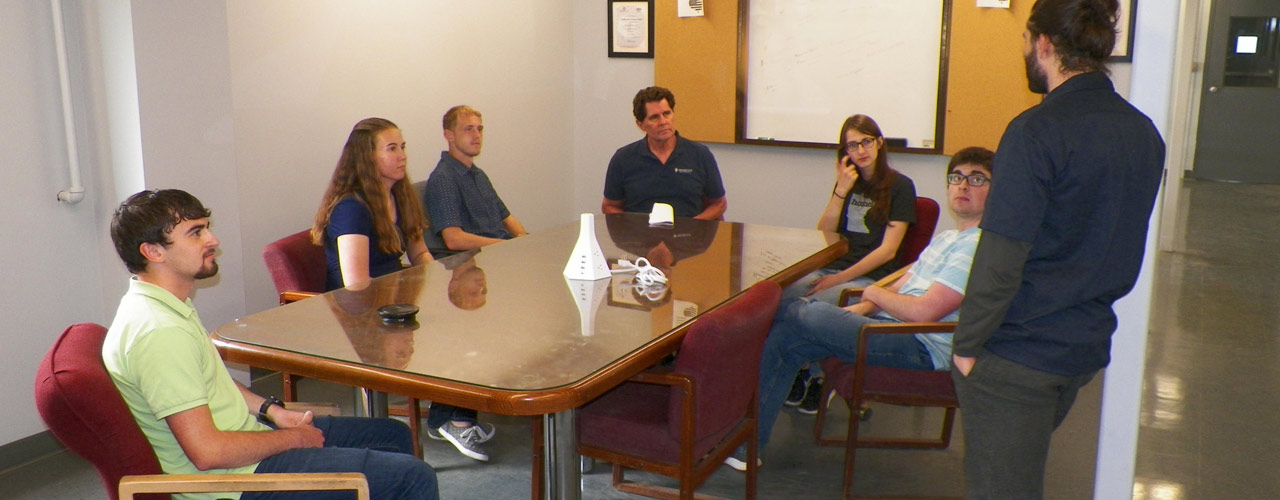by Hannah Fair, Student Public Relations Writer
 Tangible Solutions, Inc. and Cedarville University’s schools of engineering and pharmacy have partnered to further develop 3D-printing titanium technology for the orthopedics industry. The partnership will go into effect in August 2019.
Tangible Solutions, Inc. and Cedarville University’s schools of engineering and pharmacy have partnered to further develop 3D-printing titanium technology for the orthopedics industry. The partnership will go into effect in August 2019.
Tangible Solutions is a contract manufacturer of 3D-printed titanium implants for orthopedic device companies. Founded in 2013, the company serves orthopedic implant OEMs who need a medical device supplier.
— Tim Norman
3D printed titanium is a choice metal for medical implants due to its biocompatibility and pro-cell growth characteristics. The strength, stiffness, corrosion-resistance and high strength makes 3D-printed titanium well suited for bone and joint implant applications such as scaffolds, which are frames over which bone tissue cells can grow.
The partnership between Tangible Solutions and Cedarville will focus on understanding how 3D-printed architecture, structure and surface design characteristics affect the functionality of 3D-printed titanium for successful implant design and manufacturing.
“Our customers spends thousands of hours engineering the next generation of orthopedic implants,” said Adam Clark, CEO of Tangible Solutions. “Tangible Solutions’ sole focus is 3D-printing titanium orthopedic implants for OEMs. We aim to use this knowledge to further elevate the high standards of 3D-printed orthopedics. Furthermore, Cedarville University is an impressive institution and they have a very passionate staff and student body.”
A team of Cedarville students will study a matrix of 3D-printed titanium variables in order to evaluate cell viability outcomes for various 3D-printed architectural and surface designs.
The students will work with Matthew Shomper, Tangible Solutions’ director of engineering and a 2011 Cedarville graduate; Dr. Tim Norman, distinguished professor of mechanical and biomedical engineering; Dr. Rocco Rotello, associate professor of pharmaceutical science; and Dr. Tim Tuinstra, professor of electrical engineering.
Rotello will focus on improving the bone cell type grown in Cedarville’s lab. He is growing a new type of cell that better represents what happens in the body. Tuinstra is helping a student develop computer software that can count cell growth.
Students will learn metal additive printing technologies, numerical analysis, surface property characterization, mechanical testing, cell culture techniques and how to engineer the architectural design of implants.
“We have an ongoing effort at Cedarville to develop 3D printed scaffolds for implant tissue innovations,” said Norman. “We are coupling our expertise in design and characterization and cell culturing of the scaffolds with the manufacturing expertise of Tangible Solutions in the area of 3D printing titanium implants. This is a very multidisciplinary endeavor.”
Located in southwest Ohio, Cedarville University is an accredited, Christ-centered, Baptist institution with an enrollment of 4,193 undergraduate, graduate and online students in more than 150 areas of study. Founded in 1887, Cedarville is recognized nationally for its authentic Christian community, rigorous academic programs, including its Bachelor of Science in Mechanical Engineering, Bachelor of Science in Electrical Engineering, and Doctor of Pharmacy programs, strong graduation and retention rates, accredited professional and health science offerings and leading student satisfaction ratings. For more information about the University, visit www.cedarville.edu.



















